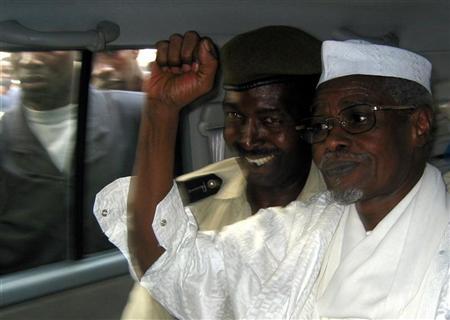By Diadie Ba
DAKAR (Reuters) – Senegal’s new government pledged on Friday it would try exiled former Chadian president Hissene Habre for alleged atrocities during his eight-year rule but gave no start date for the trial.

In the latest international call for Habre to face justice after more than 20 years of exile in Senegal, U.S. Secretary of State Hillary Clinton urged the West African state this week to prosecute him or extradite him to Belgium.
Belgium, whose legal system allows it to prosecute serious crimes committed abroad, asked the United Nations’ highest court in March to order Senegal to put Habre on trial or to extradite him to face charges of torture and crimes against humanity.
“Senegal’s position is that we must judge Habre here in accordance with the recommendations of the African Union,” Justice Minister Aminata Toure told Reuters.
“We believe that in Africa and Senegal in particular that we have a system that is fully capable of judging this case,” said Toure, a member of the two-month-old government of new President Macky Sall.
Habre, 70, who was ousted in a coup in December 1990 by current President Idriss Deby, has been accused of thousands of killings and other atrocities during his rule of the Central African state.
He has lived in Senegal since the coup despite efforts over the last ten years to seek his trial either in Senegal or another country.
The fact that the International Criminal Court has pursued exclusively African cases has led to a sense among many on the continent that Africa should administer its own justice. Former Ivory Coast president Laurent Gbagbo is the latest notable to await trial in the Hague for alleged crimes against humanity.
The previous Senegalese government of Abdoulaye Wade had said at first it did not have the jurisdiction to hold a trial. Once laws were changed, it said it lacked the funds.
The government then said it would extradite Habre to Chad to face trial, but backed away from the decision following an outcry from international organisations over concerns that Habre, who had been sentenced to death in absentia in Chad, may not get a fair trial and face a possible death sentence.
Toure said she could not give a start date for a trial, but added that there was a political will in Sall’s government to fight against impunity and a desire to ” move resolutely toward a trial of Hissene Habre”.
She also raised the issue of the cost of bringing Habre to court, which could delay the trial but said that donor partners were prepared to help Senegal.
“I am quite sensitive to the argument that victims have waited a long time and that the pace should accelerate.”





